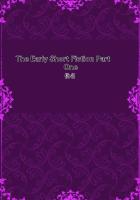The 'now' is the link of time, as has been said (for it connects past and future time), and it is a limit of time (for it is the beginning of the one and the end of the other). But this is not obvious as it is with the point, which is fixed. It divides potentially, and in so far as it is dividing the 'now' is always different, but in so far as it connects it is always the same, as it is with mathematical lines. For the intellect it is not always one and the same point, since it is other and other when one divides the line; but in so far as it is one, it is the same in every respect.
So the 'now' also is in one way a potential dividing of time, in another the termination of both parts, and their unity. And the dividing and the uniting are the same thing and in the same reference, but in essence they are not the same.
So one kind of 'now' is described in this way: another is when the time is near this kind of 'now'. 'He will come now' because he will come to-day; 'he has come now' because he came to-day. But the things in the Iliad have not happened 'now', nor is the flood 'now'-not that the time from now to them is not continuous, but because they are not near.
'At some time' means a time determined in relation to the first of the two types of 'now', e.g. 'at some time' Troy was taken, and 'at some time' there will be a flood; for it must be determined with reference to the 'now'. There will thus be a determinate time from this 'now' to that, and there was such in reference to the past event.
But if there be no time which is not 'sometime', every time will be determined.
Will time then fail? Surely not, if motion always exists. Is time then always different or does the same time recur? Clearly time is, in the same way as motion is. For if one and the same motion sometimes recurs, it will be one and the same time, and if not, not.
Since the 'now' is an end and a beginning of time, not of the same time however, but the end of that which is past and the beginning of that which is to come, it follows that, as the circle has its convexity and its concavity, in a sense, in the same thing, so time is always at a beginning and at an end. And for this reason it seems to be always different; for the 'now' is not the beginning and the end of the same thing; if it were, it would be at the same time and in the same respect two opposites. And time will not fail; for it is always at a beginning.
'Presently' or 'just' refers to the part of future time which is near the indivisible present 'now' ('When do you walk? 'Presently', because the time in which he is going to do so is near), and to the part of past time which is not far from the 'now' ('When do you walk?'
'I have just been walking'). But to say that Troy has just been taken-we do not say that, because it is too far from the 'now'.
'Lately', too, refers to the part of past time which is near the present 'now'. 'When did you go?' 'Lately', if the time is near the existing now. 'Long ago' refers to the distant past.
'Suddenly' refers to what has departed from its former condition in a time imperceptible because of its smallness; but it is the nature of all change to alter things from their former condition. In time all things come into being and pass away; for which reason some called it the wisest of all things, but the Pythagorean Paron called it the most stupid, because in it we also forget; and his was the truer view.
It is clear then that it must be in itself, as we said before, the condition of destruction rather than of coming into being (for change, in itself, makes things depart from their former condition), and only incidentally of coming into being, and of being. A sufficient evidence of this is that nothing comes into being without itself moving somehow and acting, but a thing can be destroyed even if it does not move at all. And this is what, as a rule, we chiefly mean by a thing's being destroyed by time. Still, time does not work even this change; even this sort of change takes place incidentally in time.
We have stated, then, that time exists and what it is, and in how many senses we speak of the 'now', and what 'at some time', 'lately', 'presently' or 'just', 'long ago', and 'suddenly' mean.















